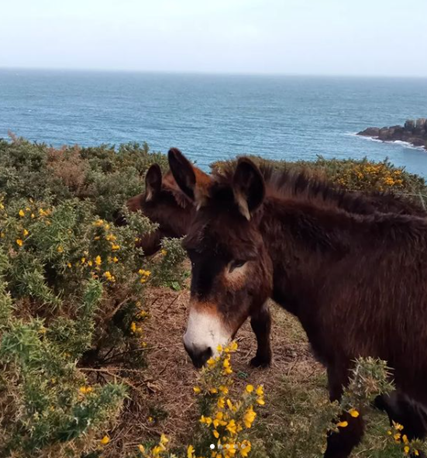Wherever you roam on Scilly, the sweetly-scented yellow flowers of the European gorse are not far behind. Often seen sprawling across the coastal paths, this invasive species is known for contributing to the unfortunate loss of diverse maritime grassland. The grazing of Red Ruby cattle has proven an effective way to manage the land and allow more species of wildflowers and lichen to thrive, but what other animals can be utilised for conservation? The answer may surprise you, because recently the Isles of Scilly Wildlife trust have used…
….donkeys!
Earlier this year, a pair of local donkeys were observed tucking into a vast amount of gorse, devouring it faster and in greater quantities than the Red Ruby’s, which led to an idea. Would these donkeys be any good at grazing across the SSSI? Donkeys are foragers and love a variety of textures to chew on, especially the spiky branches of a gorse bush! Foraging in this way, which includes selective browsing by picking out individual flavours and textures, provides excellent enrichment and mental stimulation for donkeys and other equines. Fascinatingly, they don’t seem to mind spikes in their mouths, and even seem to seek it out over easier to eat shrubbery.
Unlike cows, donkeys have small hooves and lighter bodies. This means they have less of an impact on the land. Alongside horses and ponies, donkeys are considered a key species in habitat management. The way donkeys carefully browse the vegetation creates areas of sparse patchwork land, allowing species such as lichen to grow on the bare earth without destroying the entire habitat. Donkeys have evolved to wander in search of food, which means their grazing is never concentrated to a particular area. Given enough space, they will roam continuously as they eat, providing equal amounts of attention to a wide variety of vegetation.









